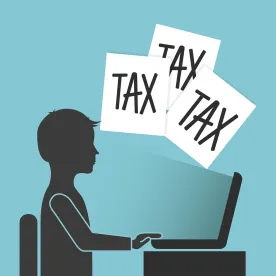The Senate Finance Committee unveiled a section-by-section description of its tax reform package on November 9, 2017, including municipal bond provisions that reject efforts by the House Ways and Means Committee to terminate the tax exemption for interest earned on qualified private-activity bonds and public-purpose bonds issued to finance the construction of professional sports stadiums, and the tax-favored status of tax credit bonds. However, the Senate's version of the Tax Cuts and Jobs Act follows the House in repealing the tax exemption on bonds that advance refund governmental or qualified § 501(c)(3) bonds after 2017, leaving the future of advance refundings in substantial doubt. The Joint Committee on Taxation (JCT) projects that the Senate's version of the act will raise $16.8 billion from its repeal of advance refunding bonds, compared to $56.9 billion that the House bill plans to raise from various tax-exempt-bond repeals.
Earlier on November 9, the House Ways and Means Committee completed its tax reform bill (H.R. 1) and reported it out of committee without changing the provisions that would adversely affect the tax-exempt bond market. As discussed in further detail in our alert on November 3, 2017, the House version would prohibit the issuance after December 31, 2017, of: all private activity bonds; tax credit bonds providing either a tax credit or direct-subsidy payment; advance refunding bonds; and governmental bonds used to build professional sports stadiums (with an earlier effective date of November 2, 2017).
Legislative Timetables and Uncertainties
The Senate Finance Committee is expected to have statutory language available when it begins its markup of the act on today at 3 p.m. ET, and a vote of the Committee is expected within the next few days. On the other side of Capitol Hill, the House Ways and Means Committee bill was approved on Friday and is scheduled to be considered by the House Committee on Rules on Wednesday. House Speaker Paul Ryan (R-WI) has indicated that he expects to bring the House tax-reform bill to the floor for a vote on Thursday. A vote in the Senate could be held as soon as the week after Thanksgiving.
House Speaker Ryan and Senate Majority Leader Mitch McConnell (R-KY) both have said that they want to approve a tax-reform bill before the end of 2017. For that to happen, Senate Republicans must work within strict budgetary and procedural constraints. The Senate's version of the act must add no more than $1.5 trillion to the federal deficit over 10 years and must also satisfy an additional requirement that the tax reforms add nothing to the federal deficit beyond a 10-year budget window, which ends in 2027 for legislation passed this year. These budgetary restrictions and other limits on what can be considered part of a "reconciliation" measure in the Senate were established under Section 313 of the Congressional Budget Act of 1974 and are popularly referred to as the "Byrd Rule" (after their initial sponsor, the late Senator Robert C. Byrd (D-WV)).
If the Senate's bill raises federal deficits for any fiscal year after 2027, a Senator may raise a point of order against the legislation, which would require part of the legislation to be struck or 60 Senate votes to waive the Byrd Rule. Senate leaders understand the difficulty of obtaining this number of votes on a highly partisan piece of tax legislation, leaving deficit-neutrality within 10 years as the only practical option for the act to pass the Senate. In this regard, it is significant that the House bill, as written, violates the Byrd Rule because it would add about $155 billion to the 2028 federal deficit, according to estimates by the Committee for a Responsible Federal Government.
While the House and Senate will need to resolve their different tax proposals in a conference committee after each chamber passes its bill, most commentators expect the final version of the act to look more like the Senate's plan than like the House's version because of the stricter constraints on reconciliation bills in the Senate under the Byrd Rule. The Senate Finance Committee's mark already faces serious side-constraints because it is within $4.3 million of violating the reconciliation instructions' $1.5 trillion target for deficit increases through 2027. That leaves the Senate with little margin for error if it accepts any of the popular provisions in the House plan, such as the individual deduction for state and local real estate taxes—which are not part of the Senate's initial draft—and it remains to be seen whether any of those measures will be accommodated through cuts elsewhere in the bill, delays in implementation of some measures, or earlier expiration dates for others.
Certainty as to the fate of municipal bonds will come only with a final tax reform bill passed by both chambers and a signature of the President. If such tax reform is not enacted by year's end, lingering uncertainty as to the provisions and effective date of subsequent attempts at legislation could prevent some deals from being issued on a tax-exempt basis well into the new year.
This is the latest in an ongoing series of our advisories on the federal tax reform effort and its potential impact on organizations and people across the American economy. Please click on the topics below to read previous alerts:







 />i
/>i

